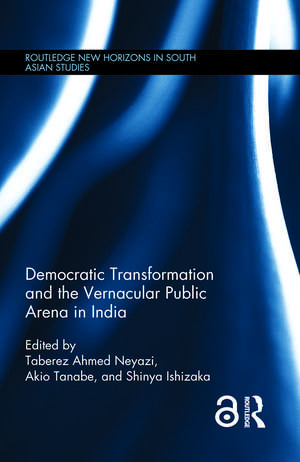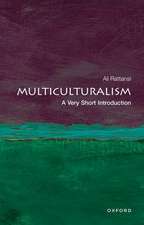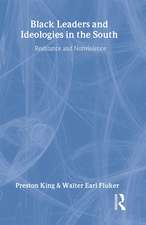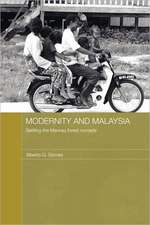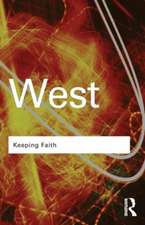Democratic Transformation and the Vernacular Public Arena in India: Routledge New Horizons in South Asian Studies
Editat de Taberez Neyazi, Akio Tanabe, Shinya Ishizakaen Limba Engleză Hardback – 20 iun 2014
In this volume, we intend to understand this deepening of democracy by employing a new analytical framework of the 'vernacular public arena' where negotiations, dialogues, debates, and contestations occur among 'vernacular publics'. This reflects the profound changes in Indian democracy as diverse social groups, including dalits, adivasis, and Other Backward Classes; minorities, women; individuals from rural areas, towns, and cities; the poor and the new middle classes–the 'vernacular publics'–participate in new ways in India’s public life. This participation is not confined to electoral politics, but has extended to the public arenas in which these groups have begun to raise their voice publicly and to negotiate and engage in dialogue with each other and the wider world. Contributors demonstrate that the participation of vernacular publics has resulted in the broadening of Indian democracy itself which focuses on the ways of governance, improving people’s lives, life chances, and living environments.
An original, comprehensive study that furthers our understanding of the unfolding political dynamism and the complex reshuffling and reassembling taking place in Indian society and politics, this book will be relevant to academics with an interest in South Asian Studies from a variety of disciplines, including Political Science, Sociology, Anthropology, and Media Studies.
The Open Access version of this book, available at http://www.taylorfrancis.com, has been made available under a Creative Commons Attribution-Non Commercial-No Derivatives 4.0 license.
Din seria Routledge New Horizons in South Asian Studies
-
 Preț: 292.01 lei
Preț: 292.01 lei -
 Preț: 313.01 lei
Preț: 313.01 lei -
 Preț: 309.89 lei
Preț: 309.89 lei -
 Preț: 325.72 lei
Preț: 325.72 lei -
 Preț: 469.34 lei
Preț: 469.34 lei -
 Preț: 449.41 lei
Preț: 449.41 lei -
 Preț: 381.98 lei
Preț: 381.98 lei -
 Preț: 389.11 lei
Preț: 389.11 lei -
 Preț: 372.45 lei
Preț: 372.45 lei -
 Preț: 386.39 lei
Preț: 386.39 lei -
 Preț: 389.66 lei
Preț: 389.66 lei -
 Preț: 390.63 lei
Preț: 390.63 lei - 18%
 Preț: 1007.72 lei
Preț: 1007.72 lei
Preț: 822.54 lei
Preț vechi: 1104.35 lei
-26% Nou
Puncte Express: 1234
Preț estimativ în valută:
157.44€ • 171.08$ • 132.34£
157.44€ • 171.08$ • 132.34£
Carte tipărită la comandă
Livrare economică 21 aprilie-05 mai
Preluare comenzi: 021 569.72.76
Specificații
ISBN-13: 9780415738675
ISBN-10: 0415738679
Pagini: 238
Ilustrații: 8 black & white illustrations, 5 black & white tables, 1 black & white halftones, 7 black & white line drawings
Dimensiuni: 156 x 234 x 18 mm
Greutate: 0.48 kg
Ediția:1
Editura: Taylor & Francis
Colecția Routledge
Seria Routledge New Horizons in South Asian Studies
Locul publicării:Oxford, United Kingdom
ISBN-10: 0415738679
Pagini: 238
Ilustrații: 8 black & white illustrations, 5 black & white tables, 1 black & white halftones, 7 black & white line drawings
Dimensiuni: 156 x 234 x 18 mm
Greutate: 0.48 kg
Ediția:1
Editura: Taylor & Francis
Colecția Routledge
Seria Routledge New Horizons in South Asian Studies
Locul publicării:Oxford, United Kingdom
Public țintă
PostgraduateCuprins
1. Introduction: The Vernacular Public Arena and Democratic Transformation in India 2. Politics of Relations and the Emergence of Vernacular Public Arena: Global Networks of Development and Livelihood in Odisha 3. Social Politics: Youth Vernacular Action in the Indian Himalayas 4. Empowering the Vernacular Publics: Civil Society and Democratic Participation in Rajasthan 5. News Media and Political Participation: Re-evaluating Democratic Deepening in India 6. Jan Andolans and Alternate Politics in India: Symbiotic Interactions, Vernacular Publics and News Media in Jan Lokpal Andolan 7. Ways of Democracy: Making Politics Work for the Urban Poor 8. Re-evaluating the Chipko (Forest Protection) Movement: The Emergence of Vernacular Publics in the Uttarakhand 9. Grassroots and Vernacular Articulations: Politics and Popular Democracy in Uttar Pradesh Villages 10. Caste and Vernacular Politics in Tamil Nadu, South India 11. Against the Public Sphere: The Morals of Disclosure and the "Vernacular Public Sphere" in Rural Rajasthan 12. Communal Riots and States: A Comparative Study of Gujarat and Uttar Pradesh
Notă biografică
Taberez Ahmed Neyazi is an Assistant Professor at the Centre for Culture, Media & Governance at Jamia Millia Islamia, New Delhi. He has been a Japan Society for the Promotion of Science Postdoctoral (JSPS) Fellow at Kyoto University and a Visiting Fellow at the East-West Center in Hawaii.
Akio Tanabe is Professor at the Graduate School of Asian and African Area Studies and the Director of the Center for the Study of Contemporary India, Kyoto University. His publications include the award-winning Caste and equality: Historical anthropology of local society and vernacular democracy in India (in Japanese) (Tokyo, 2010).
Shinya Ishizaka is a Visiting Associate Professor, Graduate School of Asian and African Area Studies, Kyoto University and Research Fellow, Center for Area Studies, National Institutes for the Humanities. He is the author of Environmental movement in India: Gandhism and 'connective politics' (in Japanese) (Kyoto, 2011).
Akio Tanabe is Professor at the Graduate School of Asian and African Area Studies and the Director of the Center for the Study of Contemporary India, Kyoto University. His publications include the award-winning Caste and equality: Historical anthropology of local society and vernacular democracy in India (in Japanese) (Tokyo, 2010).
Shinya Ishizaka is a Visiting Associate Professor, Graduate School of Asian and African Area Studies, Kyoto University and Research Fellow, Center for Area Studies, National Institutes for the Humanities. He is the author of Environmental movement in India: Gandhism and 'connective politics' (in Japanese) (Kyoto, 2011).
Descriere
This book analyses the unprecedented, democratic transformation which is currently taking place in India, by employing a new analytical framework of the "vernacular public arena" where negotiations, dialogues, debates and contestations occur among "vernacular publics." This reflects the profound changes in Indian democracy as diverse social groups, including dalits, adivasis and Other Backward Classes; minorities, women; individuals from rural areas, towns, and cities; the poor and the new middle classes – the "vernacular publics" – participate in new ways in India’s public life.Contributors demonstrate that the participation of vernacular publics has resulted in the broadening of Indian democracy itself which focuses on the ways of governance, improving people’s lives, life chances, and living environments.
